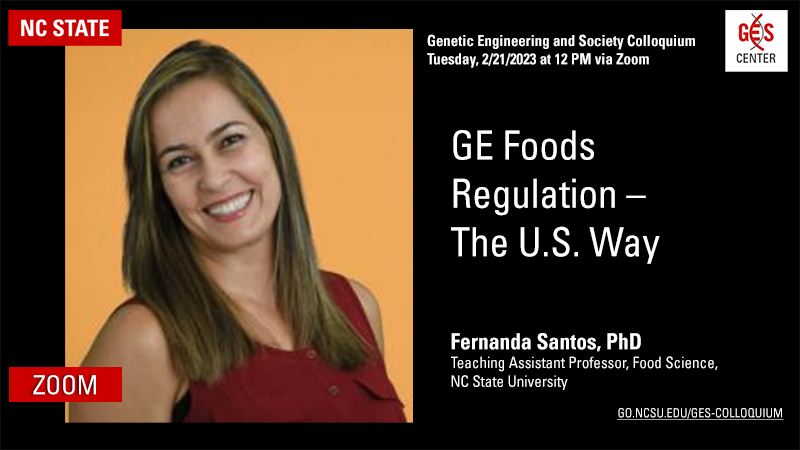
- This event has passed.
Fernanda Santos – GE Foods Regulation – The U.S. Way | GES Colloquium

Colloquium Home | Zoom Registration | GES Video Library (current) | Video Archives | Podcast | @GESCenterNCSU | Newsletter
GE Foods Regulation – The U.S. Way
Fernanda Santos, PhD, Teaching Assistant Professor, Food Science, NC State University
Website | Twitter @fbnsncstate
This discussion aims to give participants some thought-provoking information on how food is generally regulated in the U.S., in addition to a general overview of the process utilized by the regulatory bodies to approve genetically engineered foods for human consumption.
Abstract
“The definition of food law used to be a simple one – it encompassed food regulatory law with two main audiences: lawyers and the regulated food industries. Today, however, food law is often broadened in meaning to include all law related to agricultural trade, such as how food is grown, humane animal treatment, and environmental rules for farms and processors.” (From Food Regulation by Neal Fortin)
The development of genetically engineered foods created an even greater (and heated) discussion linked to several complex issues, especially safety in terms of consumption and the understanding of their impact on the environment. So, the question is: “How should these foods be regulated?” The United States takes a more relaxed approach compared to the strict rules of the European Union. Despite the differences, the final goal is the same: ensuring that foods entering the markets are safe for consumption. This presentation will summarize the main characteristics of the regulation of genetically engineered foods in the United States.
Related links:
- Fortin, N. Food Regulation: Law, Science, Policy, and Practice. Wiley, 2nd. ed., 2022.
- Roberts, M.T. Food Law in the United States. Cambridge University Press, 2015.
- Strauss, S., Sax, J. Ending event-based regulation of GMO crops. Nature Biotechnology, 34, 474–477 (2016). https://doi.org/10.1038/nbt.3541
- BE Disclosure | USDA
- Biotechnology | USDA
- How GMOs Are Regulated in the United States | FDA
- Movement of Certain Genetically Engineered Organisms – Final Rule | Federal Register
- “Natural” Modifications: The FDA’s Need to Promulgate an Official Definition of “Natural” that Includes Genetically Modified Organisms | The George Washington Law Review
- Regulation of Biotech Plants | USDA
- Revised Regulations (previously SECURE Rule) | USDA
- Same Science, Different Policies: Regulating Genetically Modified Foods in the U.S. and Europe | Harvard University
- What’s the Right Way to Regulate Gene-Edited Crops? | Leaps.org
Speaker Bio
Dr. Fernanda Santos is a veterinarian, poultry scientist, and food safety specialist. During her veterinary training, her primary focus was zoonotic diseases and disease prevention. Then, she focused her work on pathogen growth in foods of animal origin, quality control programs, and molecular tools. She has also studied alternative methods and nutritional strategies to improve performance and reduce Salmonella intestinal colonization in poultry. Currently, at NC State, her focus is food safety and course development. She is responsible for the graduate food safety minor and teaching several courses in the food science program, including food laws and regulations and food product development. She has also created a new series of courses, “The Discover Series”, which are food science-related courses that are taught not only to food science/nutrition students but also to any undergraduate student who seeks to understand the science behind foods and controversial topics of food and nutrition.
GES Colloquium (GES 591-002) is jointly taught by Drs. Jen Baltzegar and Dawn Rodriguez-Ward, who you may contact with any class-specific questions. Colloquium will generally be live-streamed via Zoom, with monthly in-person meetings in the 1911 Building, Room 129. Please subscribe to the GES newsletter and Twitter for updates .
WordPress database error: [Unknown column 'wp_tec_occurrences.start_date' in 'SELECT']SELECT SQL_CALC_FOUND_ROWS wp_posts.*, CAST( wp_tec_occurrences.start_date AS DATETIME ) AS event_date
FROM wp_posts LEFT JOIN wp_term_relationships ON (wp_posts.ID = wp_term_relationships.object_id) LEFT JOIN wp_postmeta ON ( wp_posts.ID = wp_postmeta.post_id AND wp_postmeta.meta_key = '_EventHideFromUpcoming' ) LEFT JOIN wp_postmeta AS mt1 ON ( wp_posts.ID = mt1.post_id )
WHERE 1=1 AND wp_posts.ID NOT IN (18426) AND (
wp_term_relationships.term_taxonomy_id IN (149,521,604)
OR
wp_term_relationships.term_taxonomy_id IN (45,518,607,872,883)
) AND (
wp_postmeta.post_id IS NULL
AND
( mt1.meta_key = '_EventStartDate' AND CAST(mt1.meta_value AS DATETIME) >= '2026-03-02 20:00:11' )
) AND wp_posts.post_type IN ('post', 'page', 'attachment', 'tribe_venue', 'tribe_events', 'tribe_event_series') AND ((wp_posts.post_status = 'publish'))
GROUP BY wp_tec_occurrences.occurrence_id
ORDER BY event_date ASC, wp_posts.post_date ASC
LIMIT 0, 3